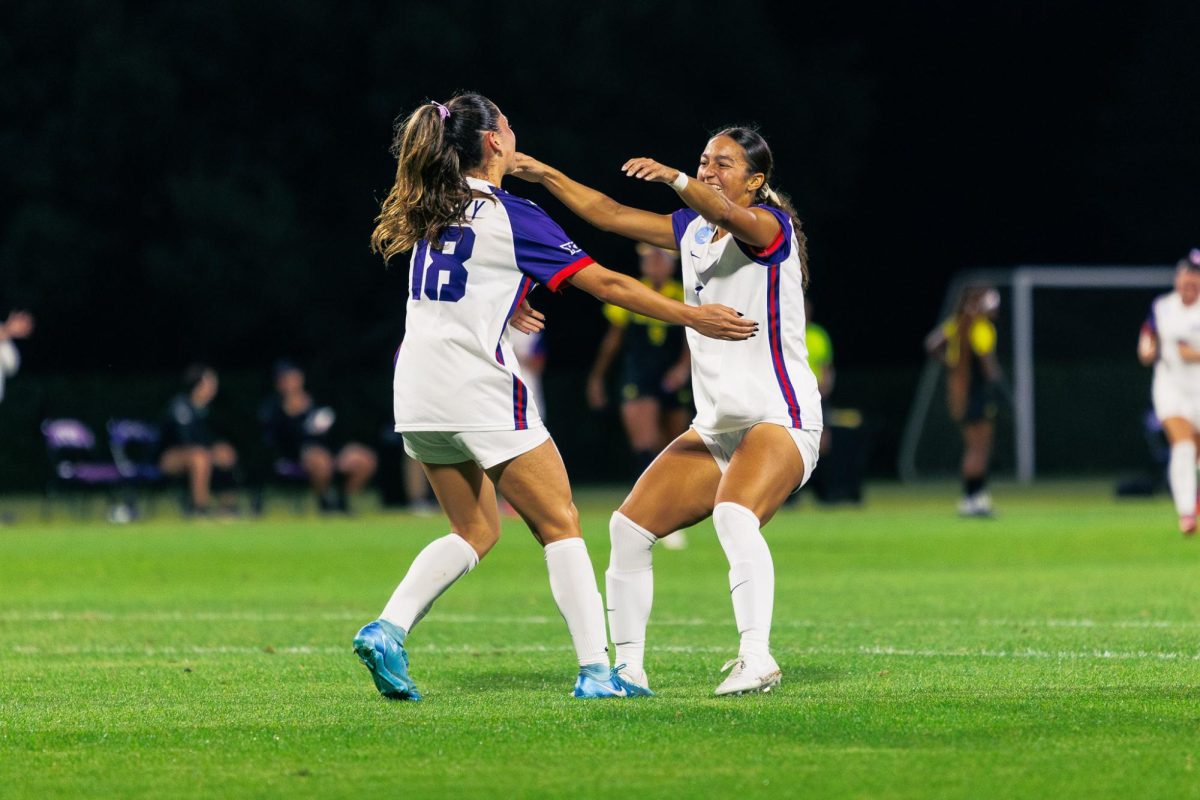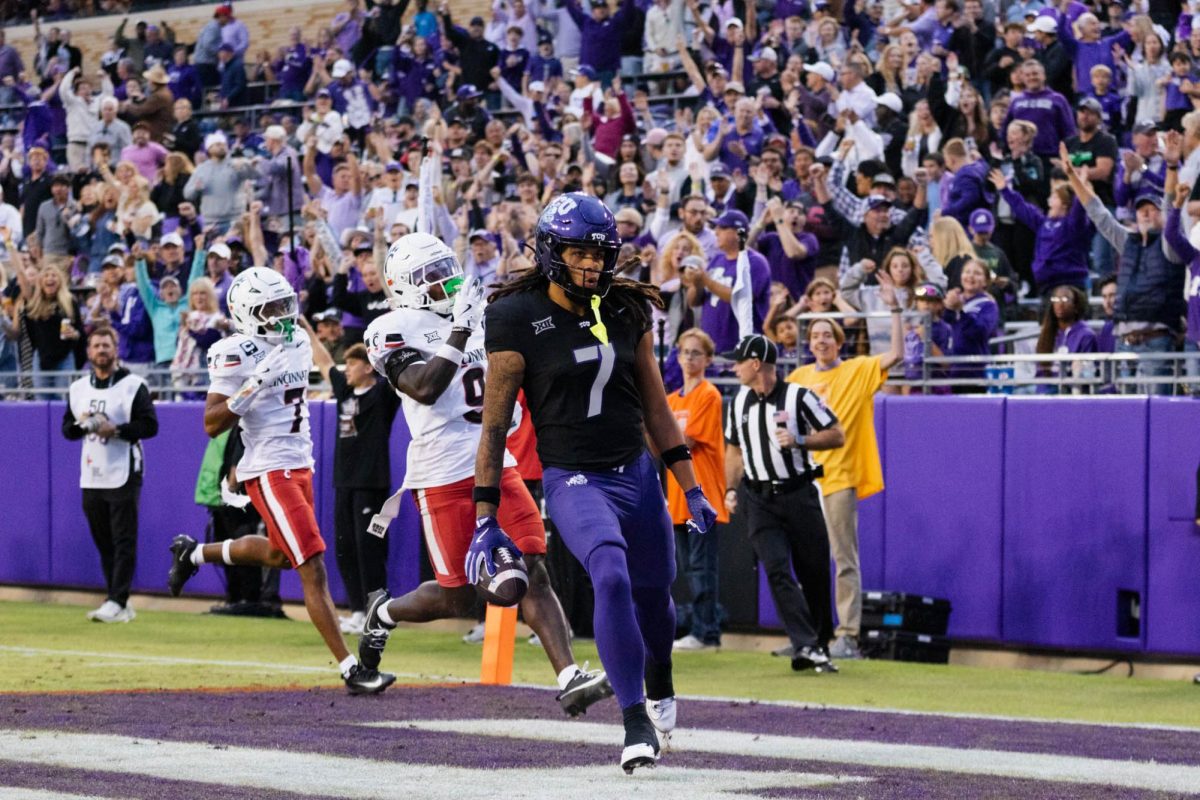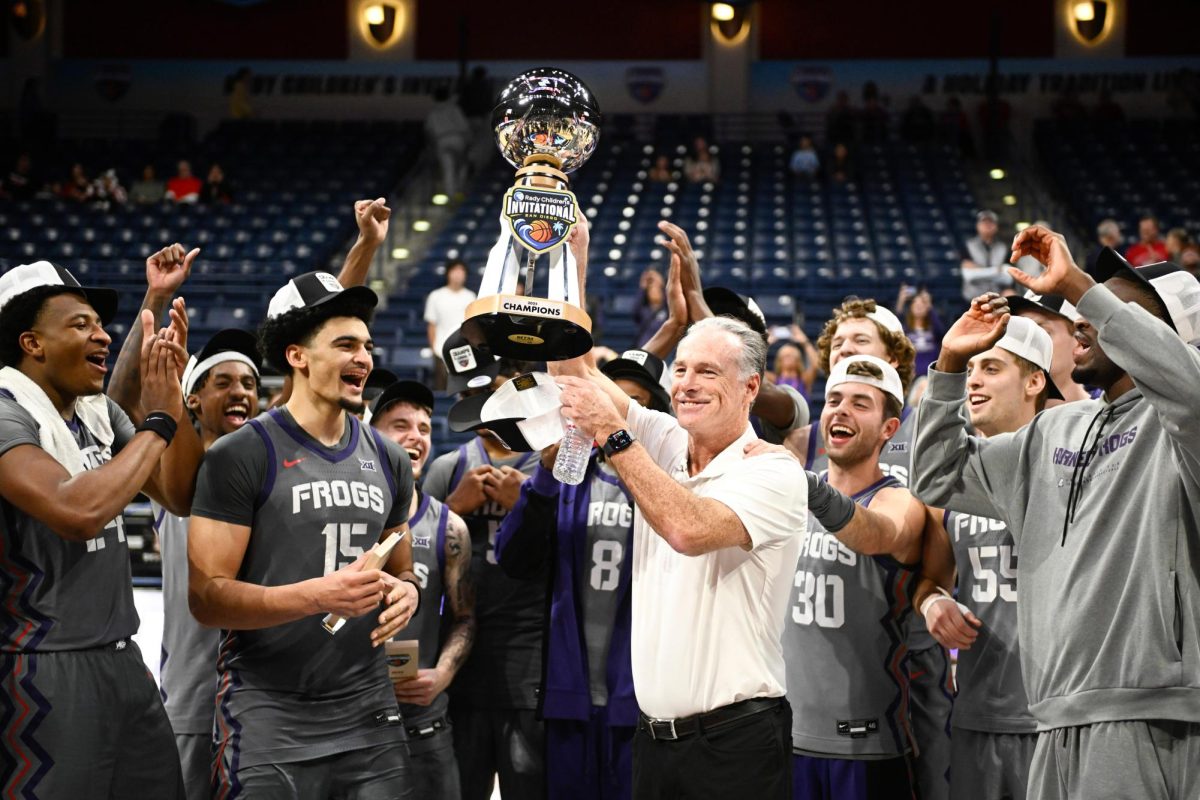Think of what comes to mind when you first consider the term “athlete.” It could be an Olympian, a swimmer, a football player, a marathon-runner or anyone with an inherent sport gene.
But does a horse ever cross your mind?
For the TCU equestrian team, horses are athletes, too.
“They’re teammates, not just horses,” sophomore Hunt Seat rider Kaitlin Perry said. “They’re not just an accessory. They’re living, breathing things and they deserve respect.”
In competition and in practice, working together as a team means not only working with the other student athletes, but working with each of the team’s 36 horses as well, Hunt Seat head coach Logan Fiorentino said.
“Just as with student athletes, as a coach, you work with different personalities,” Fiorentino said. “It’s the same with horses. People think horses don’t have emotion, but some you can’t be tough with, you need a different approach.”
Before every practice, the teammates are responsible for grooming the horses and checking for general health, Fiorentino said. Those 30 minutes before practice allow the student athletes to get to know the horses and better care for them.
Just like the riders, each horse has an attitude of its own.
“Throughout the season, they really take on their own personality,” Fiorentino said. “You’ve got the jock, big and athletic and he kind of knows it. You have the quiet kid who is really smart that everyone secretly wants to hang out with. You have the flirt, the cheerleader, the sensitive soul where you kind of have to hold their hand.”
Through discovering those personalities, some riders say it’s easy to find their favorites and attach to them.
Perry’s favorite, a Hunt Seat horse named Ella, is described as a “queen bee,” requiring everyone to speak to her politely for cooperation. Perry said she earned some of her highest scores on Ella.
“She just makes me feel unstoppable,” she said.
Perry said caring for Ella requires careful and meaningful attention. She said sometimes it’s simpler to “manipulate” those horses to believe the equestrian’s idea is their idea to bring in more points of pride.
In opposition, Leo, a Hunt Seat horse and junior Caitlin Ader’s favorite, is described as a “big teddy bear” and the king to Ella’s queen.
“He’s like Aslan, the wise lion from Narnia,” Ader said. “Just a wise, sweet old man, and I love him. He’s my hero.”
Ader said Leo’s more sensitive personality helps her to connect with him, and that he requires detailed attention to his emotions to be on the same page.
Overtime, senior Haley Jacobi’s favorite, carries with him a longer history and closer bond.
Jacobi’s family donated Overtime to the TCU equestrian team three years ago. Jacobi said she has known Overtime for 16 years and always looks forward to caring for him before every practice.
“He’s super chill, like a sweet Labrador who just wants to be in your lap, doted on and played with,” Jacobi said. “He’s quiet – you kind of have to tell him when it’s time to work, because if you ask him, it’s like he’s saying ‘No, I’m too old.’”
Jacobi said she has not yet drawn Overtime for a ride during competition, but feels proud of him while watching her teammates ride with him.
“He’s a Frog for life, definitely a team leader,” Jacobi said. “I like watching him – I expect a lot from him.”
One challenge the team faces that is unique from other sports is finding out how to best interact with the horses in order to create a smooth ride and close relationship, Fiorentino said.
“Horses don’t speak English, so understanding them is a lot about the ability to feel their response and see their reaction when you tell them to perform something,” she said.
Much of the time this requires self-diagnosing, which Fiorentino said consists of knowing what to watch for with each horse and what to expect.
This method is also necessary when understanding horses from other schools, Perry said.
At equestrian matches, riders are given four minutes to familiarize themselves with the horses they draw in a random selection, Fiorentino said. At games away from home, riders do not have the advantage of knowing their horse's personality, and are required to understand their new horse in those four minutes alone.
“It depends on the horse,” Perry said. “If you talk to them, just talk to them like humans. Some horses don’t like being talked to.”
Perry said the best way to understand a new horse in a short amount of time is to simply jump on and work the flat pattern until it is easier to understand the horse's personality.
Some riders, like Jacobi, said riding on an unfamiliar horse can sometimes give the visiting team an advantage.
“Since you don’t have instinct like you do on your own horse, you won’t have any worry or anticipation,” she said. “You just feel what’s going on and stay in the moment, which could be an advantage.”
This year, the team received six new horses, which continue to train alongside the others even after the end of the home season, Fiorentino said. A select amount of TCU horses travel with the team to conference tournaments and the National Collegiate Equestrian Association Championships in April.
Fiorentino said the horses usually come from families or are former jumpers from Europe who are trained into the college equitation format.
Through the rest of the season, the horses remain in training to help the equestrians prepare for championships.
“We want horses that will challenge our riders,” Fiorentino said. “That way, we can be prepared for anything that comes our way.”




